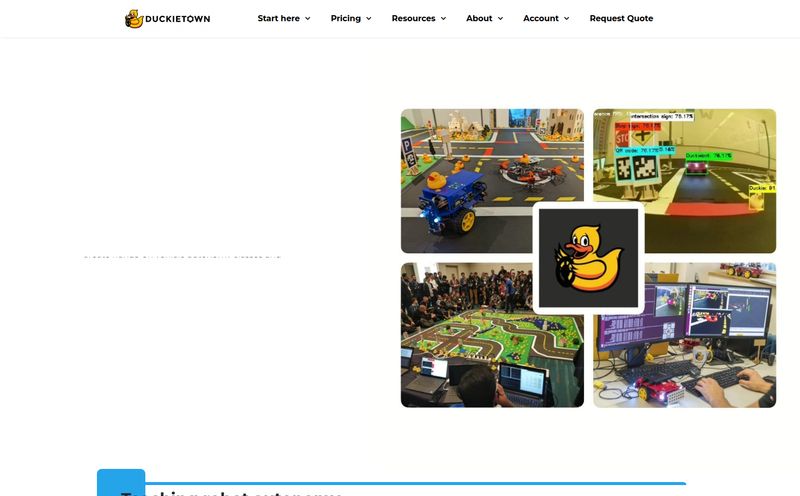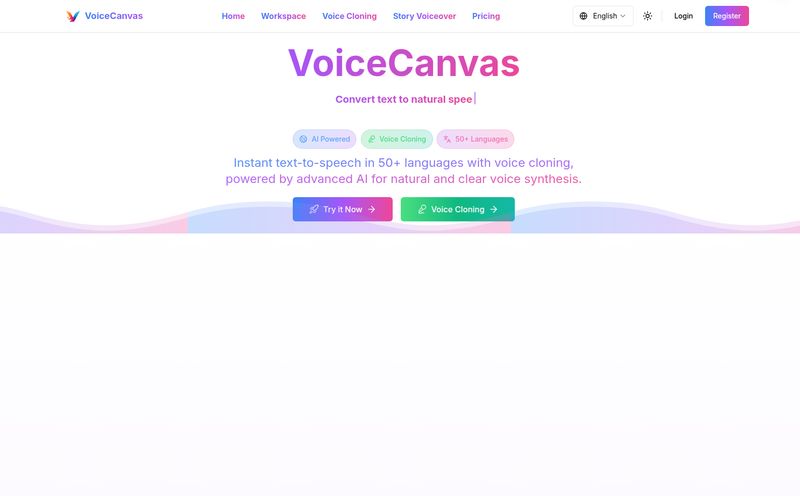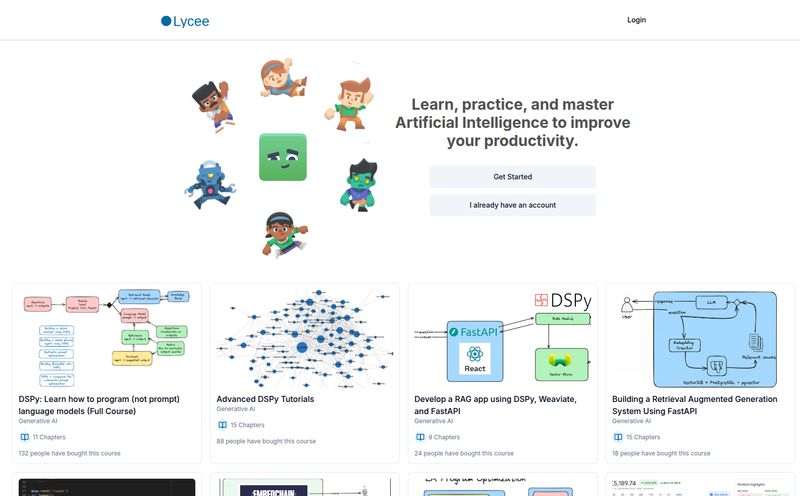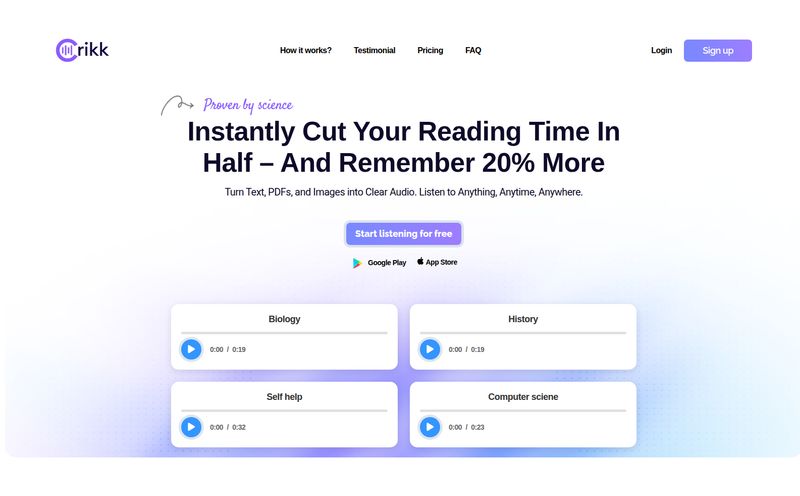I’ve been in the tech and SEO space for years, and I’ve seen a lot of tools promise to “revolutionize” an industry. Most of the time, it's just marketing fluff. A new coat of paint on an old idea. But every now and then, something comes along that genuinely makes you stop and think. Something that feels… different. That’s the feeling I got when I first stumbled upon Kaiden AI.
We’re not talking about another productivity app or a new social media platform. We're talking about a tool designed for one of the most high-stakes professions out there: law enforcement. It's a voice-driven, AI-powered simulation platform built to train officers for the chaos of the real world. Think of it less like a video game and more like a high-tech sparring partner for your brain and your words.
Let's be real, traditional training methods have their limits. Role-playing with fellow officers is great, but it’s hard to shake the feeling that you’re just talking to Dave from accounting. It lacks that spark of unpredictability. Kaiden AI wants to change that. But does it deliver? Let’s get into it.
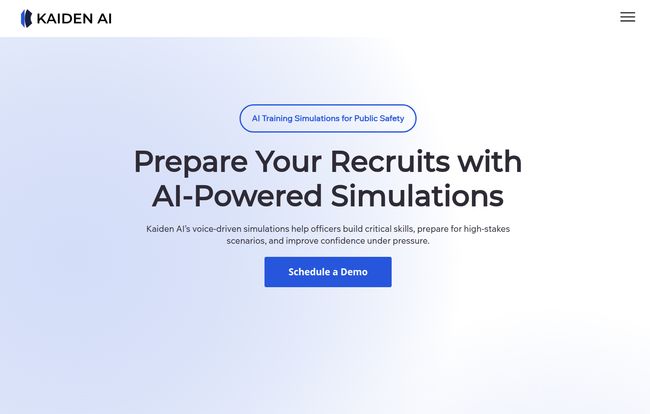
Visit Kaiden AI
So, What Exactly is Kaiden AI?
At its heart, Kaiden AI is a training simulator. But forget clunky joysticks or pre-selected dialogue options. The entire system is driven by your voice. You talk to the AI characters in the simulation just like you would talk to a person on the street. The AI listens, understands, and reacts in real-time. It’s designed to help officers, from fresh-faced recruits to seasoned veterans, sharpen their communication and decision-making skills under pressure.
The platform throws you into various scenarios—a traffic stop that’s getting tense, a wellness check, a domestic dispute—and forces you to navigate them. The goal isn’t to “win” but to learn. It’s about building muscle memory for de-escalation and procedural correctness before you ever have to do it for real.
More Than Just a High-Tech Video Game
I've seen my fair share of training software, and it's easy to be skeptical. But the approach Kaiden AI takes is pretty clever, focusing on a few key areas that make it stand out.
The Voice is Everything
This is the core of the whole thing. The fact that it's voice-driven is a huge deal. Communication is an officer's number one tool, right? This platform forces you to use that tool. You can’t just click a button that says “Calm the person down.” You have to actually find the words, modulate your tone, and respond to what the AI is saying. It’s about practicing the art of communication, not just the theory.
Scenarios You Can Actually Use
One of the biggest complaints I hear about training software is that it's generic. Kaiden AI seems to have heard that loud and clear. They boast that their scenarios are customizable to align with specific agency needs, local protocols, and even state-specific standards. This is critical. A scenario that works for the NYPD might not be relevant for a sheriff's department in rural Wyoming. The ability to create training that reflects the unique challenges of your community is, frankly, a massive advantage.
Feedback That Doesn’t Pull Punches
After each simulation, the platform provides instant, actionable feedback. It’s not just a pass/fail grade. It breaks down your performance, showing you where you excelled and where you might've misstepped. This immediate feedback loop is how skills are built. You don't have to wait for an instructor to review a recording a week later. You can see the results, process the feedback, and jump right back in to try again. It’s like having a coach sitting on your shoulder, minus the awkwardness.
The Real-World Impact on Officer Training
This all sounds great on paper, but what about results? The website highlights some impressive metrics: they claim to provide scenarios that cover 50% of academy training needs and that their users have completed over 600,000 sessions. That's a lot of practice.
The testimonials they feature also paint a compelling picture. They aren't from random users; they're from people with serious credentials in law enforcement and training. For instance:
"Recruits using Kaiden AI felt more confident entering field training... It provides them a tool that can be used at their own pace to ensure that their skills is exactly what police training needs."
- Lt. Chris Hsiung (Ret.), Mountain View PD
And this one, which I think really hits the nail on the head:
"It’s the future of training for law enforcement. You can do thousands of reps with this tool, which is impossible with role players."
- Lt. Col. (Ret.) John McShane
That idea of “reps” is so important. Just like an athlete, an officer needs to practice fundamental skills over and over. Kaiden AI provides a way to get those repetitions in a safe, controlled, and endlessly repeatable environment. The platform isn't just for rookies either; it's designed for everyone from 911 dispatchers handling frantic calls to in-service officers needing a refresher on new protocols.
The Good, The Bad, and The Realistic
Okay, let's get down to brass tacks. No tool is perfect, and as an analyst, I always look for the potential downsides. It’s important to have a balanced view.
On the plus side, the immersive and realistic environment is a clear winner. The instant feedback and deep customization are also huge selling points that address major shortcommings in traditional methods. It genuinely seems to boost officer confidence and preparedness. A neat little bonus is the mention of an Insight OMNIA contract, which for government agencies, can streamline the whole procurement process. That’s a practical detail that shows they understand their target market.
However, there are some realistic considerations. The effectiveness is heavily reliant on voice interaction, which means you'll need good quality audio equipment. A cheap, crackly microphone isn't going to cut it. Secondly, the tool is only as good as the scenarios you design. If you put garbage in, you'll get garbage out. It will require some initial effort from the training department to customize and set up scenarios that are truly effective. This isn't a plug-and-play magic bullet, it's a powerful tool that requires thoughtful implementation.
So, What's the Price Tag?
This is the big question, isn't it? Unfortunately, Kaiden AI doesn't list its pricing publicly. I clicked around and even hit a 404 page trying to find a pricing section, which is pretty common for enterprise-level B2B or B2G (Business-to-Government) software. You'll have to schedule a demo and get a custom quote based on your agency's size and needs. While I always prefer transparent pricing, this approach makes sense for a tool this specialized. The needs of a small-town police department are vastly different from a major metropolitan force, and the pricing will likely reflect that scalability.
Frequently Asked Questions about Kaiden AI
1. Is Kaiden AI just for police recruits?
Nope. While it's a fantastic tool for academy training, it's also designed for in-service officer training and even for 911 dispatchers. The customizable scenarios allow it to be adapted for various experience levels and roles within public safety.
2. Do I need special hardware to run it?
The company doesn't specify high-end computer requirements, but a good quality microphone and headset are essential for the voice-driven system to work effectively. Clear audio input is key to the experience.
3. How difficult is it to create custom scenarios?
While Kaiden AI promotes its customizability, you should expect an initial setup and learning curve. The effectiveness of the training hinges on how well the scenarios are designed, so agencies should be prepared to invest some time in building out their specific training modules.
4. Does the AI give feedback on tone of voice?
The core of the technology is understanding and reacting to spoken commands and dialogue. While not explicitly stated, a core part of effective de-escalation training involves analyzing how things are said, so it's a key component of the interactive experience. This would be a great question to ask during a demo!
5. How do we buy Kaiden AI for a government agency?
They mention that Kaiden AI is available through the Insight OMNIA Partners contract. This is a cooperative purchasing organization, which can make the procurement process much simpler and faster for public agencies like police departments.
My Final Take
So, is Kaiden AI the future of law enforcement training? I'm leaning towards a strong yes. Or at least, it’s a massive step in the right direction. It’s not going to replace human instructors or hands-on tactical training, nor should it. But as a supplement—a gym for building communication and decision-making muscle—it’s incredibly compelling.
It tackles some of the most significant challenges in modern policing: the need for better de-escalation skills, consistent training, and preparing officers for the immense pressure of the job. By providing a safe and repeatable space to fail, learn, and improve, Kaiden AI could make a real difference in officer performance and public safety. If I were a police chief or training coordinator, I'd absolutely be scheduling a demo. It just might be one of the most important tech investments you could make.
Reference and Sources
- Kaiden AI Official Website
- OMNIA Partners, Public Sector (for information on cooperative contracts)
